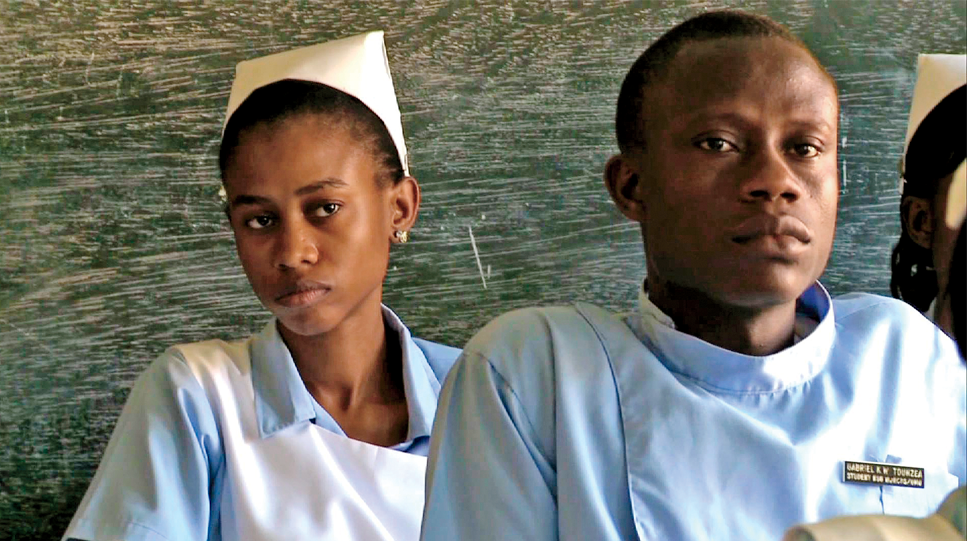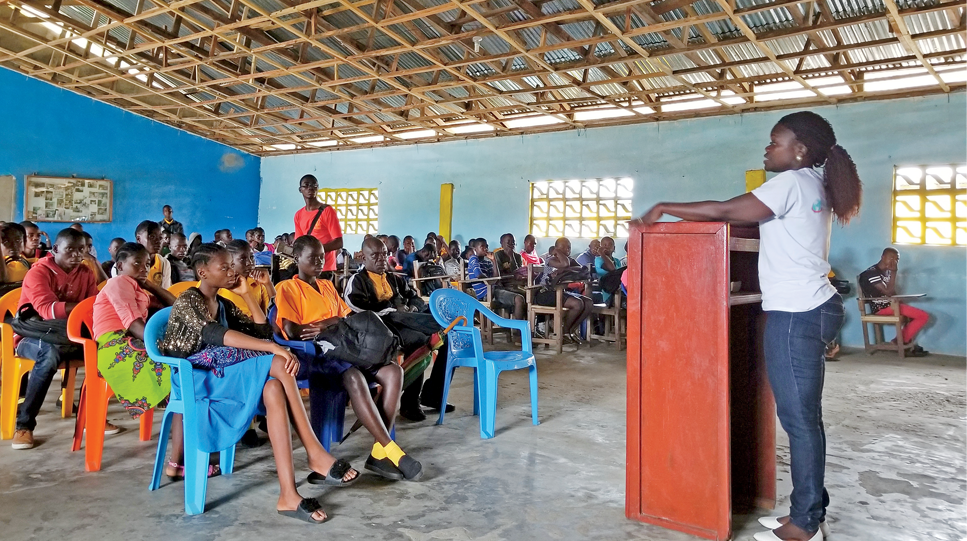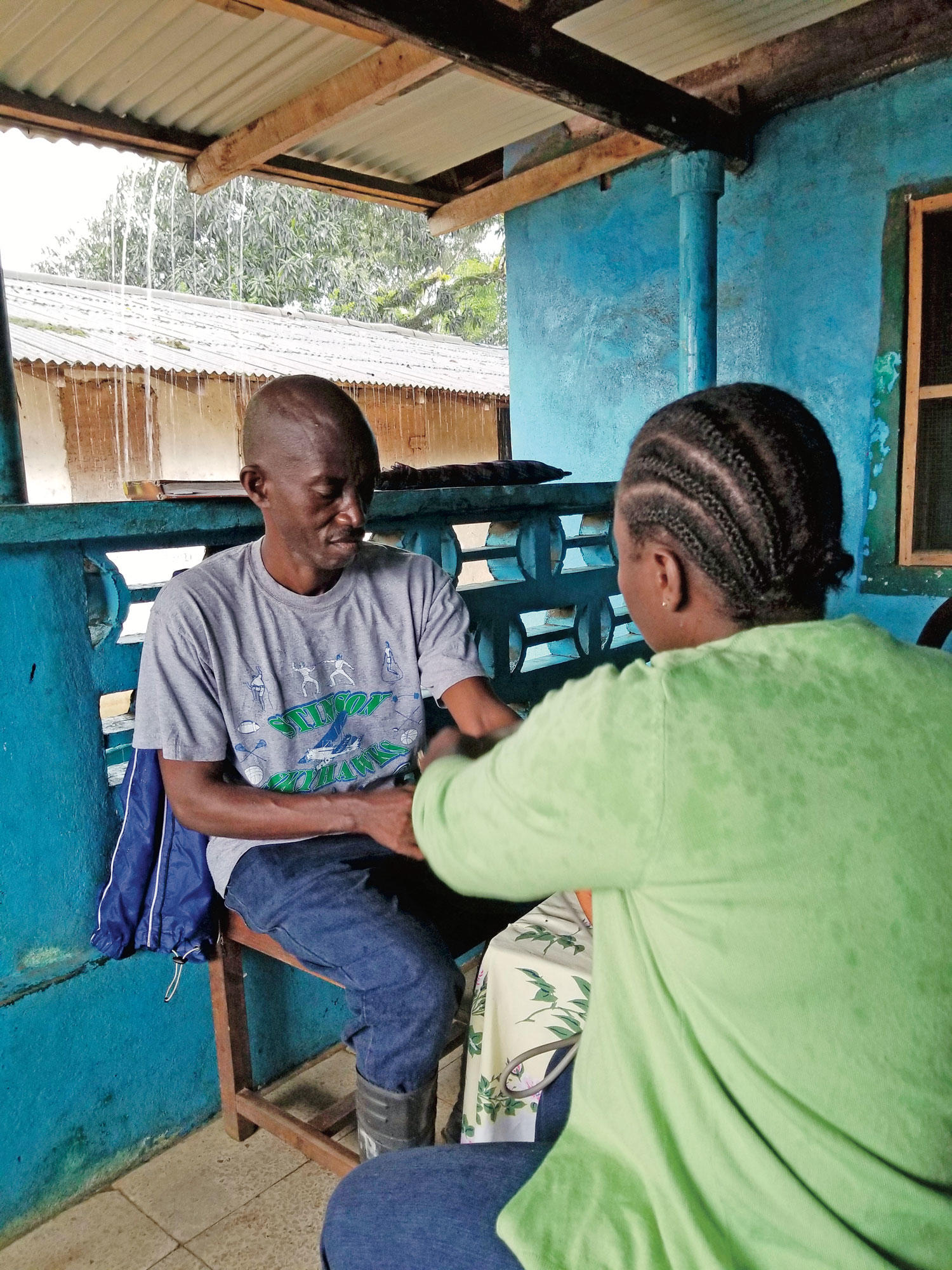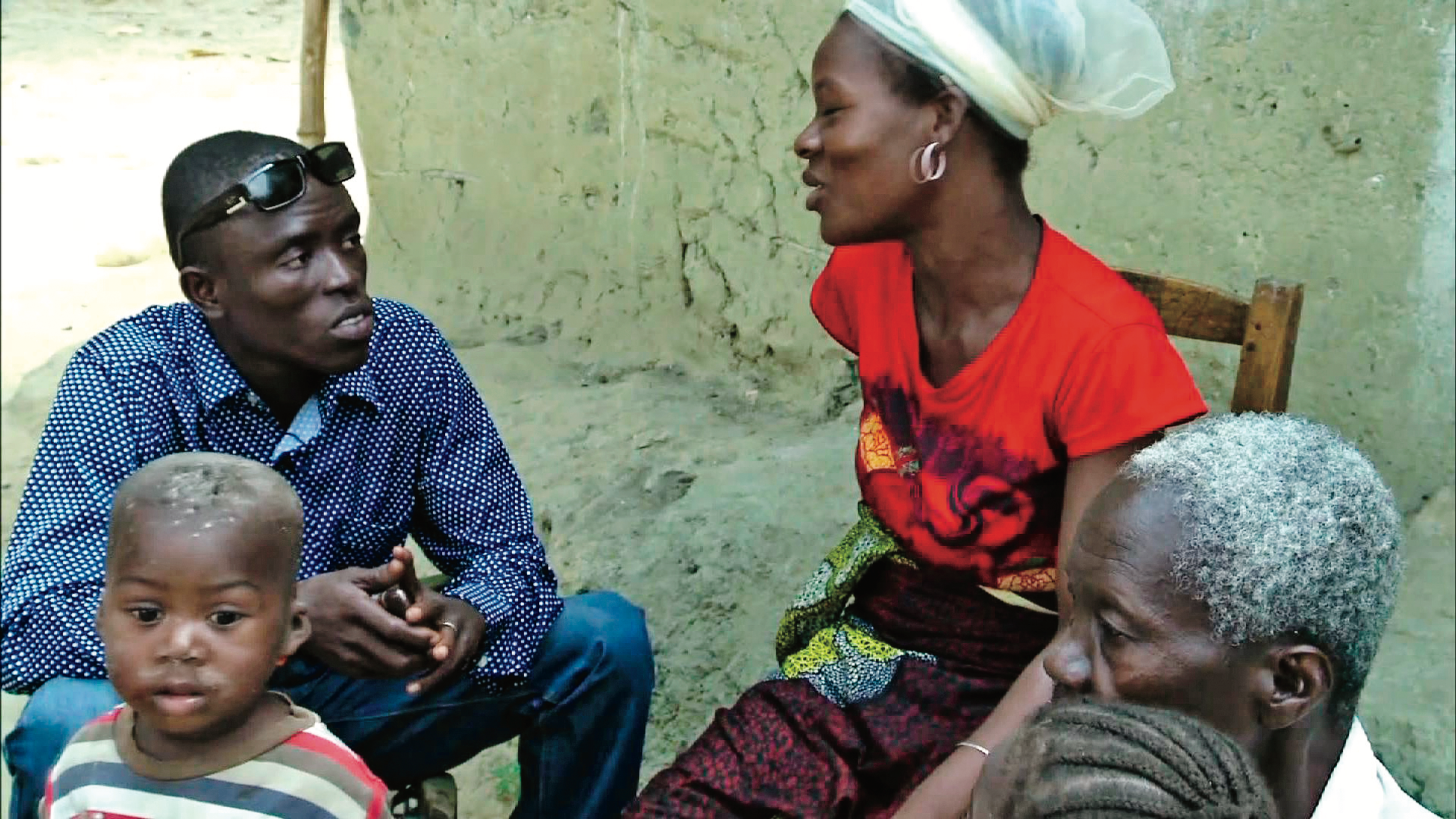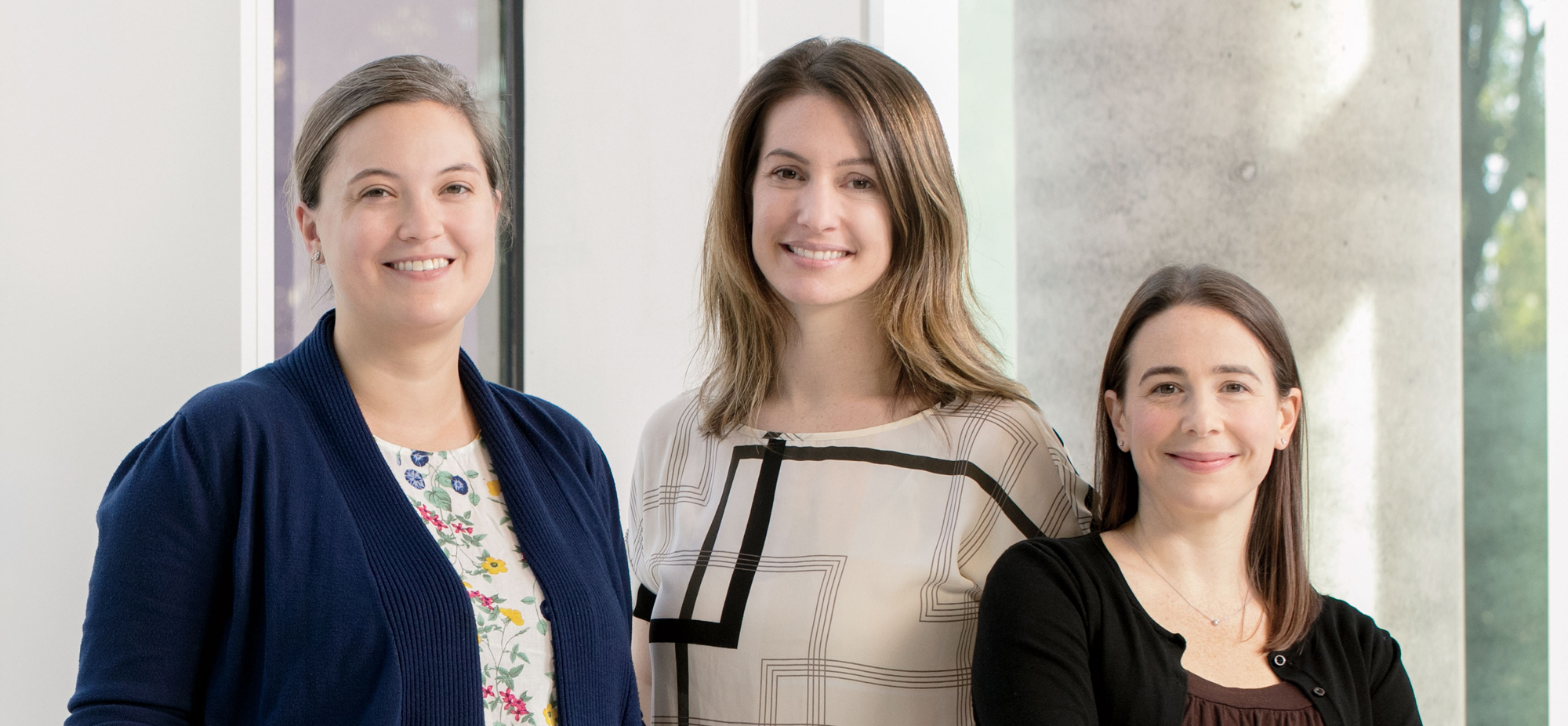
When Laura Jean Ridge ’10NRS travels to Liberia, as she does twice a year, she likes to arrive on a Sunday, which is church day. Life comes to a standstill then, and Ridge, a warm, energetic, go-getting sort of person, can decompress in her hotel room in Monrovia from the seventeen-hour flight from New York. She makes calls (cell-phone service, like Internet access, is spotty) and sets her schedule (plans in Liberia often change at the last minute). Then, on Monday morning, as the West African country resumes its workaday rhythms, she steps into a whirlwind week of meetings and visits.
Ridge, thirty-three, is the founder and president of Nursing for All (NFA), a nonprofit that takes an unusual bottom-up approach to community health: supporting local nurses who devise and run their own health-care initiatives, based on their intimate knowledge of life on the ground.
As NFA board member Jessica Buesing ’13GS, a fourth-year medical student at the College of Physicians and Surgeons, explains, “It’s easy to have ideas of what people need in global health settings and sort of impose our solutions. A lot of organizations — with the best of intentions — aren’t necessarily always addressing what’s essential.” Buesing, Ridge, and Jennifer Walsh ’09NRS compose NFA’s programming committee, offering clinical advice, funding, and wide-open ears to their Liberian counterparts. “Putting the nurses first is what makes this such a novel idea,” Walsh says.
When NFA was established in 2013, there were about fifty doctors in Liberia, serving a country of some 4.5 million people. Liberia was founded in 1847 as a US colony for ex-slaves and free African-Americans, and the society formed along colonial fault lines, as the newcomers subjugated the indigenous population. Political and social domination by the Americo-Liberians over the local tribes became entrenched. Tensions built up, and in 1989 the country spiraled into a protracted civil war, marked by executions, torture, a high rate of civilian casualties, and the use, on both sides, of child soldiers. The conflict ended in August 2003 after the abdication of President Charles Taylor.
Many doctors fled during the war, and nurses assumed the burden of providing medical care. Even today, “nurses are the backbone of the health system in Liberia,” Ridge says. And she is adamant about ensuring that NFA nurses remain where they are needed most. “We don’t want to contribute to an internal brain drain,” she says. “Every nurse that works with us must have at least a part-time job in the health field in Liberia.” With NFA nurses’ contributions to existing health services assured, Ridge can then tout the advantages of joining the organization. “We supplement your income, and you get to run your own initiative,” she says. “You set the budget, make the contacts, and set up the clinical interventions for approval. You’re the boss.”
Kormassah Baysah, a neonatal nurse, is NFA’s Monrovia program director. She’s the first person Ridge meets with on Monday, at a café called the Donut Bar. While all eleven NFA nurses in Liberia send Ridge monthly status reports on their patients, Baysah is the in-country liaison, there to support and advise the nurses and share her observations with Ridge. Over coffee they discuss nurse-midwife Delkontee King’s family-planning initiative, which offers contraceptives and counseling. Baysah says she’s impressed by how well King is known and respected in her community.
The next day, Ridge visits the Liberia Board for Nursing and Midwifery, the body that licenses nurses in Liberia. From the start, the board has welcomed NFA and helped Ridge by managing the payroll, reviewing NFA plans, and giving feedback. When NFA was trying to set up salaries, Ridge turned to the board to get a baseline.
After the meeting, Ridge goes back to her hotel and gets ready for a road trip to Ganta, Liberia’s second-largest city, two hundred miles to the northeast, about a mile from the Guinean border.
In 2012, Ridge was working as a nurse practitioner at an addiction treatment center in New York. The job ended at 4:00 p.m. sharp. Finding herself with extra time, she began looking for volunteer opportunities with groups that supported nurses in underserved communities. She was astonished at how few there were.
Ridge began thinking about starting her own nonprofit. But where to serve, and how to begin?
Putting out feelers, Ridge called her alma mater, the School of Nursing, hoping someone there could give her advice. She was referred to Richard Garfield ’86PH, a professor of clinical international nursing who had worked for the UN in Liberia.
Garfield, now a professor emeritus at the School of Nursing and an international health officer for the Centers for Disease Control and Prevention, admits that he tends to cast a skeptical eye on the ambitious plans of young, energetic idealists. “Many students want to get engaged in the world and do some international work,” he says. “Often, it’s a modified version of tourism: have some fun on the beach, drop by the clinic. But there are some people who really are serious and engage for the long term. I remember Laura being incredibly resilient and determined.”
Garfield spoke to Ridge about his experience in Liberia, a country that, despite being the fourth-poorest on earth, has a strong nursing culture, with four “competent to good” nursing schools. In Garfield’s view, Liberia was a place where advanced nursing practices and basic nursing education could be promoted. “That’s what I was steering Laura toward, but she didn’t let me steer her much. She’s very entrepreneurial, and she just took off and made it all happen.”
Ridge sent out e-mails to nursing schools in Liberia, laying out her idea for a nurse-led public-health initiative, and she received an eager reply from the West African College of Nursing. Representatives from the Monrovia chapter wanted to meet. Within a matter of weeks, Ridge got her yellow-fever shot and flew to Liberia.
In Monrovia, she met with the Liberian Board for Nursing and Midwifery and visited the nursing school at United Methodist University, at both the Monrovia and Ganta campuses. Ridge was surprised that the nursing leaders of Liberia were willing to spend so much time with her. It gave her confidence to forge ahead.
Back in New York, Ridge got to work, jumping through the legal hoops to form a nonprofit and then raising enough money from friends and family to get started. The organization went live on May 12, 2013 — International Nurses Day.
Ridge, Walsh, and Buesing all came to the health field after college. Ridge grew up in Princeton, New Jersey, and went to Harvard thinking she’d become a lawyer. It was while doing volunteer work in the Boston neighborhood of Dorchester that she saw a distinct correlation between physical and mental health. People in poor health were less likely to be happy or successful. This problem interested Ridge. She considered getting a master’s in public health, but then decided that she really wanted a clinical degree. And so she turned to nursing, an in-demand profession that had, among other qualities that appealed to her, “a strong public-health perspective.” Now she lives in Lower Manhattan with her partner, Matt Gline, and their adopted pit-bull mix, Josie (“She’s pretty much the boss of me”), and is working on her PhD in nursing.
Walsh was raised in Rye, New York, and got her BA in political science from Trinity College. She began working for a healthcare nonprofit in New York and realized she wanted “a more hands-on career.” Then she had an experience as a patient: she was treated by a nurse practitioner — a nurse with advanced training who, like a doctor, can diagnose and treat patients and prescribe medication — and was “amazed by how comprehensive her approach to my care was.” Intrigued, Walsh decided to check out the School of Nursing’s open house in Washington Heights. “I was blown away not just by the faculty, but also by how excited they were about the field, whether as nurses, clinical researchers, PhD students, nurse practitioners, midwives, or clinical nurse specialists. It seemed there was no end to where you could go with this. So I signed up, and off I went, and I haven’t looked back since.”
Buesing, a native of Southern California, went to Williams College, where she studied music and psychology. She was interested in health but overwhelmed by the options. She needed some advice. Her boyfriend (now her husband), Robert Buesing ’16BUS, happened to work with Matt Gline, and the two men arranged a call between Buesing and Ridge, in which Ridge described her own work as a nurse practitioner. Buesing was sold, and applied to the School of Nursing. During her first year, having become, in the course of her training, “passionate about physiology and pathophysiology,” Buesing switched to medical school. But her heart is still with the nurses.
“The nursing model is very patient-centered and very much about ‘What does this human being in front of me need?’” Buesing says. “I remember my first rotation in nursing school: my first patient was somebody who couldn’t do anything for himself, so I would clean him, feed him, move him, and get blankets for him. It’s a very nurturing role that I really love.”
One of the first Liberian nurses that NFA recruited was Aaron Debah. There are a few things that make Debah unusual; not least is his specialty. Most nurses treat physical ailments — malaria, HIV/AIDS, high blood pressure. But Debah is focused on mental-health conditions, which are less understood, and bound up in superstition, doubt, and stigma.
In 2011, Debah was among the first graduates of a course started by the Atlanta-based Carter Center to help establish Liberia’s first mental-health program. There was, then as now, one psychiatrist in the whole country.
When he started, Debah was the only mental-health clinician not just in Ganta but in the surrounding county. The region’s sole hospital, where Debah works, serves half a million people, many of whom lack running water and electricity. Debah has a mental-health radio show and invites listeners to call his cell phone. Often he will walk long distances to visit individual patients.
Ridge met Debah during her first trip to Liberia. Now thirty-six, Debah, who survived the war by hiding with his family in the bush, has the unrelenting, do-what’s-needed manner of nurses everywhere, but which in him seems distilled to its purest form. “When I think of my own stories, about my own life, going through the course of the war, I feel challenged to help these people,” Debah told journalist Molly Knight Raskin ’02JRN, who has been making a film about him since 2011.
NFA support can hardly account for Debah’s fortitude, or the scope of his work, but in combination they have yielded significant results. Raskin observes that simply by being allowed to admit their problems and talk about them with Debah, people are getting better: they start working again, care for their children more attentively, or talk to others about their depression. “This was an area completely ravaged by war, and people carried that event with them,” Raskin says. “Acknowledging their trauma was a starting point. Aaron is breaking open that shell of trauma, giving people an outlet to talk about it and reducing the stigma.”
As Ridge points out, families tend to be very involved in relatives’ care in Liberia, and so Debah never really addresses just one person. “It’s very rare to decontextualize the illness from the family structure,” Ridge says. “In the US, I’ve had dozens of patients whose significant others I’ve never seen. In Liberia there is a larger family context that must be dealt with, and Aaron is fully committed to dealing with that and other social structures that influence a lot of mentally ill people.”
On March 24, 2014, PBS NewsHour aired a segment about Debah’s work, produced and narrated by Raskin. The week after the broadcast, the Liberian government reported that two people in Ganta had tested positive for the Ebola virus. These were the first known cases in the country. Over the next year, Ebola would kill five thousand Liberians, many of them frontline health-care workers.
Walsh, who now works as a nurse practitioner in a women’s health practice in New Jersey, was an NFA donor when Ebola struck. She says she was “floored” by how adaptable the organization proved to be during the crisis, changing its programs in the face of this new horror. Liberian nurse Christina Andrews made sure that her HIV patients had access to their medications after the Ebola outbreak forced their Monrovia hospital to close. Others focused on Ebola education and prevention, such as encouraging handwashing. “Having nurses in Liberia identifying needs and implementing relatively simple solutions that could help a large group of people was incredible to see,” says Walsh. She was so impressed that in 2015, when Ridge asked her if she would join the board, Walsh embraced the offer.
According to Richard Garfield, NFA’s results make sense: smaller organizations, funded by individuals, have the flexibility to deliver more targeted care, whereas large international organizations — ones heavily funded by governments or the UN — must adhere to their benefactors’ conditions, however flawed or inexpedient.
“If you’re a small organization with a long-term commitment in one place, rather than trying to staff offices in a dozen countries, it’s easier to do the right thing in paying close attention to what the caregivers themselves are saying,” Garfield says.
During the Ebola epidemic, Aaron Debah risked his life every day tending to the sick. He had a wife and three kids, including a newborn. At one point, he developed symptoms and had to quarantine himself from his family. It turned out to be malaria.
The Ebola outbreak wiped out hundreds in Debah’s community. Debah persevered. With great tenacity and optimism, he took on more work than ever, helping survivors recover psychologically.
The city of Ganta has begun to come back from the war and the epidemic, but there’s still a long way to go. Ridge, after a four hour drive from Monrovia, arrives in Ganta on Tuesday night. She checks in to Jackie’s Guest House, a small, well-lit, lively hotel with a restaurant and free Wi-Fi.
The next day, Ridge meets up with Adolphus Andrews, a nurse with some training in dentistry who runs an NFA initiative for oral health, and Clinton Zeantoe, the dean of United Methodist University’s Ganta campus, who installed clean-water systems in local schools to protect children from waterborne illnesses.
When asked why he became a nurse, Zeantoe says, matter-of-factly, “I wanted to serve humanity. It’s not about money. You contribute to helping someone who is ill, and you see them get well. They are in need of care, and you are there, and at the end, they say, ‘Thank you. I’m well today.’ That brings satisfaction to me.”
Ridge makes the most of her few more days in Liberia. She visits a community near Ganta, where dirt roads lead to smaller homes with dirt floors, and people cook their food outdoors. There, nurses Gabriel Tounzea, a Carter Center mental-health program graduate, and Solomon Yah, whose NFA initiative addresses hypertension, make house calls. Later, back in Monrovia, Ridge meets Aaron Debah in a café. Debah is excited about having been admitted to a health-policy program that will take him to India for two weeks. Into the weekend, Ridge makes more site visits with nurses Sophie Reeves (in-school HIV initiative), Tohdy Nyemah (pre- and post-natal care, including HIV testing), and Annette Toegbaye (hypertension and diabetes).
Standing on people’s porches during home visits, Ridge watches and listens, noting the quality of the patient-nurse interactions. “It’s always interesting to see how enthusiastic a community member is to see the nurse,” she says. “You can tell there’s a relationship. That’s important, because a lot of what we do is teach and make recommendations, and in order for recommendations to function as treatment there has to be a lot of trust. These nurses have done an amazing job cultivating trust with their patients.”
After a week in Liberia, Ridge will have plenty of facts and figures to share with her board. Ridge, Walsh, and Buesing all emphasize the importance of organizational introspection. Are the initiatives working? Are they reaching the right number of people? How should they measure success? How should they fine-tune the metrics so that supporters can see where their money is going?
It's Sunday again. Ridge awakens. Church bells ring.
Ridge packs her bags, gets a car to the airport, and boards her flight. As her plane ascends, she can see, out the window; the Mesurado River snaking through Monrovia to the Atlantic Ocean. She's always a little sad to leave — it's like leaving family. But she knows that the people she saw in hospitals and homes are in caring hands, knows that the nurses of Liberia will be on the ground, doing what needs to be done, as they always have.
